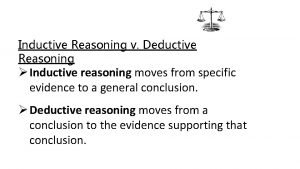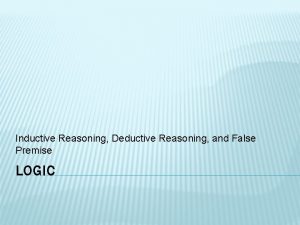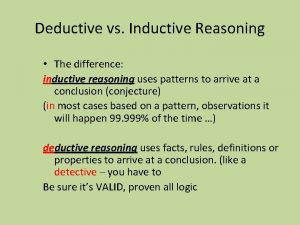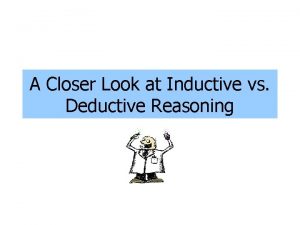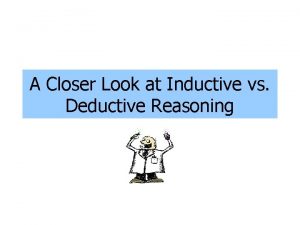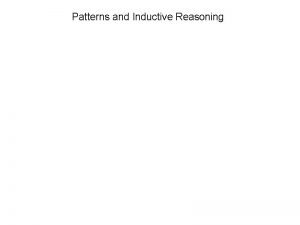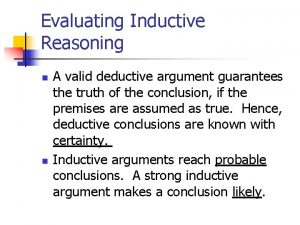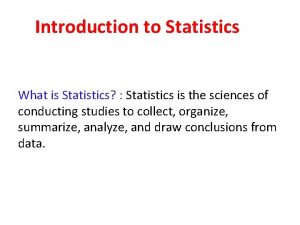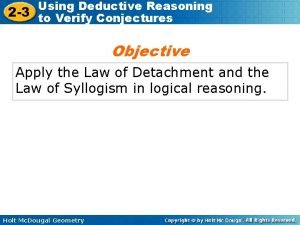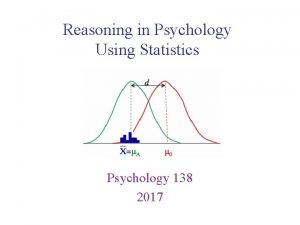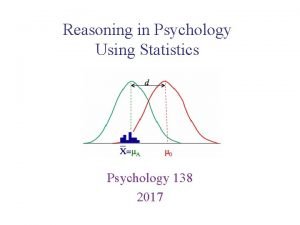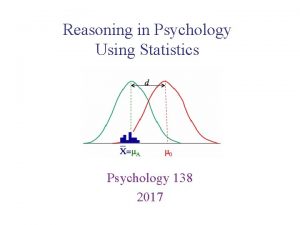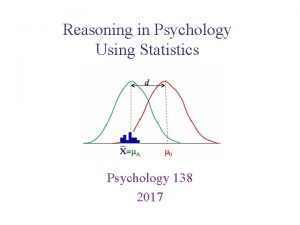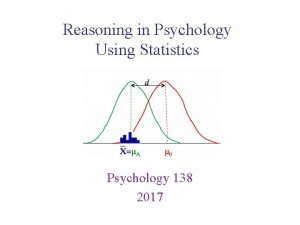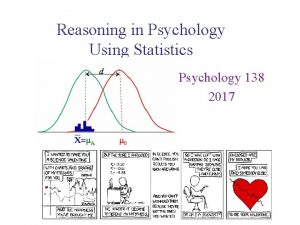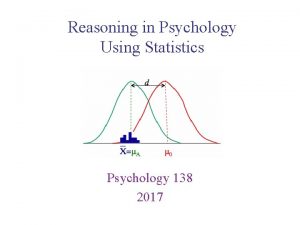Reasoning in Psychology Using Statistics Psychology 138 2017








- Slides: 8

Reasoning in Psychology Using Statistics Psychology 138 2017

"There are three kinds of lies: lies, damned lies, and statistics. ” Mark Twain “Statistics have a bad reputation. We suspect that statistics may be wrong, that people who use statistics may be "lying" -- trying to manipulate us by using numbers to somehow distort the truth. Yet, at the same time, we need statistics; we depend upon them to summarize and clarify the nature of our complex society. This is particularly true when we talk about social problems. ” Telling the Truth About Damned Lies and Statistics, Joel Best (2001) • Scientific reasoning in psychology – improve your ability conduct and consume psychological research • Statistical Literacy – the ability to follow and understand arguments from data Course objectives Reasoning in Psychology Using Statistics

“It’s about almost everything in modern society. ” Bennett, Briggs, Triola (2003), Statistical Reasoning for Everyday life • Statistics are tools, used to make decisions based on data – Descriptive statistics – Inferential statistics • Data are numbers with a context – How were the numbers measured, what do they mean? What are Statistics? Reasoning in Psychology Using Statistics

• Main points from the video – Every statistical test starts with an appropriate selection of subjects – Inferences must be based on more than one observation because of variability – Two types of error must be controlled while testing hypotheses – A decision is based on two things: • The difference between groups • The variability of the scores Video review Reasoning in Psychology Using Statistics • Inferential statistics: hypothesis testing – rats, robots, and roller skates Wiley (1977)

• Scientific Method Producing Data Describing Data Conclusions from Data – Ask the research question – Identify variables and formulate the hypothesis – Define your population – Select a research methodology – Collect your data from a sample – Analyze your data – Draw conclusions based on your data – Repeat The research process Reasoning in Psychology Using Statistics

• Methodological basics: what are data and how they are produced – Research methods – Sampling • Observation methods • Experimental methods • Quasi-experimental – Variables • Types • Operational definitions – Measurements • Continuous and discrete • Scales of measurement • Samples and populations • Statistics and parameters • Techniques – – Basic Probability Experimental control Reliability Validity Producing Data Reasoning in Psychology Using Statistics • Internal and external • Confounds & Bias

• Descriptive Statistics: Statistical tools/procedures to help organize, summarize, and simplify large sets of data (distributions) – Describing a single distribution • Tables and Graphs • Properties – Shape, Center, Spread • Locating scores & Transforming distributions (z-scores) – The Normal distribution (Unit Normal Table) – Describing the relationship between 2 distributions • Correlation (Pearson’s r) Describing data Reasoning in Psychology Using Statistics

• Inferential Statistics: Procedures which allow us to make claims about the population based on sample data – Distribution of sample means – Hypothesis testing • Central Limit Theorem • Standard error – Error types • Type 1 (α) • Type 2 (β) • • • 1 -sample z test 1 -sample t test Related samples t-test Independent samples t-test Chi-squared test Correlation and regression – Estimation • Point estimates • Confidence intervals Conclusions from Data Reasoning in Psychology Using Statistics
 Deductive reasoning
Deductive reasoning Inductive vs deductive reasoning
Inductive vs deductive reasoning Difference of inductive and deductive reasoning
Difference of inductive and deductive reasoning Inductive vs deductive geometry
Inductive vs deductive geometry Every quiz has been easy. therefore the quiz will be easy
Every quiz has been easy. therefore the quiz will be easy Inductive reasoning is reasoning based on patterns
Inductive reasoning is reasoning based on patterns What is inductive argument
What is inductive argument Introduction to statistics what is statistics
Introduction to statistics what is statistics Using deductive reasoning to verify conjectures
Using deductive reasoning to verify conjectures
